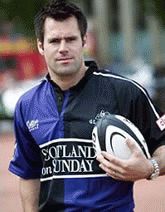In the Sunday Times Kenny talks about last week's long - and arduous - teambuilding exercise at RM Condor.
Marines? A military camp? You may think, in this era of professional rugby, that square bashing and jumping around in sand dunes is taking the 'back to basics' philosophy a wee bit far.
'Train hard, fight easy' is the Marines' motto. Very appropriate to modern rugby, but it could just as well have been 'Train hard, sleep easy'. We were tucked up by nine every night, totally knackered. Hardly surprising because the regime was tough: up at six, weight training at 6.15, breakfast, then running in the dunes, assault courses, fireman's lifts and press-ups in the briny. Then more weight training, plus double helpings of aerobics for anyone considered overweight. You get the picture.
Training in the dunes was tougher than anybody expected. They had us sprinting up a slope you would normally use a rope to climb. Then we did fireman's lifts through soft sand, press-ups in the sea and sprinting on the beach. The following day we tackled the assault course. We had to get a huge tractor tyre across it and believe me, that takes real teamwork. The tyre had to go over a 10 foot wall, we then had to cross planks 12ft above the ground and negotiate a climbing frame.
All great fun, but pretty exhausting. The commando regime, like the world of professional sport, involves complete self-belief, trust in your squad, and mental and physical toughness. Like us, they are a team.
For all its remorselessness, the week was as good humoured as it was great fun, but that's not what I expected when I first heard about this 'brainwave' (not the first word that came to my mind). I'd just returned to Glasgow from Wasps a month ago when someone mentioned going to camp. Oh no, I thought. We'd be in for an uphill, down-dale bollocking from some sergeant major who would take sadistic delight in showing us who the real professionals were.
I couldn't have been more wrong. The Marines were fantastic and Paddy Quinlan, an ex-commando, and PTI sergeant John Telford (he who trained England down at the Marines' Devon base last year) had worked out special sessions designed specifically for our needs (strength rather than just endurance). With the season fast approaching and our first friendly matches against Leeds and Sale only a fortnight away, the emphasis now for Glasgow Warriors has to be upon fitness.
Modern rugby is all about physicality, so strength and fitness are the cornerstones. It is vital that Scotland — not just Glasgow — gets to grips with this as we attempt to rebuild the game in this country. The gap between the nations is getting bigger and it is time to put our shoulders to the wheel, or further risk losing the initiative.
Last season Glasgow came second from bottom in the Celtic League. Yet the story could so easily have been different. We (I say we, even though I was still with Wasps) showed ourselves capable of beating Europe's top sides, played some dazzling rugby and yet failed to capitalise upon our strengths. Couldn't the same be said of Scotland? After fluffing the Six Nations, we gave a hint of what we are capable of Down Under.
In the past you will find that Scotland have often failed to capitalise on success. Take 1999 when we won the last Five Nations, but instead of bursting off the blocks the next season like true defending champions, we rested on our laurels and were rescued from the Wooden Spoon only by the arrival of Italy (to whom we lost, before beating England).
It's a rollercoaster pattern. But discipline and professionalism will change all that. Also, the arrival of a much needed new regime at the SRU, under Phil Anderton, Matt Williams, Ian McGeechan and David Mackay will make the organisation more dynamic. I foresee that the slimmed down new unit will have a positive influence on the Scottish game all the way down to junior club level.
Professional rugby in Scotland has its critics. Many say it soaks up too much of the SRU's cash. I see franchising of the pro sides as a solution to that. It will free up funds for club level. We also need to bring up players and coaches through the ranks, and they need to be coached and inspired by people who have played at the top and know what it is to be a professional sportsman. That all takes money, but it's far from being a pipe dream.
But back to basics. At the end of every season you need to take stock and approach the new campaign with a sharpened edge. The edge that Wasps used, and the key to their success — they were the most successful side in Europe — was fitness. Hiring Mark Bitcon, Wasps' chief fitness coach, was a coup for Glasgow. During Bitcon's two seasons with Wasps they won the Zurich Premiership twice and the Parker Pen Challenge Cup and Heineken Cup in successive years.
Fitness can turn a good player into a world-class one. It also enhances mental toughness, and if you want to have a winning side you have got to have one that really wants to win, one that is tough mentally as well as physically. You've also got to have 15 blokes who feel they are playing in a team. To that end, our commando training camp was the perfect preparation for the rigours of the forthcoming season.
Some say I came back for a gentle cruise into retirement. They are wrong. I always wanted to come back — always said I would return — to put something back into the game in the country which gave me so much in the first place. Hopefully I can.











